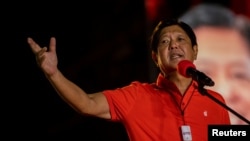ຜູ້ສະໝັກ ເປັນປະທານາທິບໍດີ ທີ່ມີຄະແນນນຳໜ້າຂອງຟິລິບປີນ ທ່ານເຟີດີນັນ ມາໂກສ ຈູເນຍ (Ferdinand Marcos Jr.) ຈະພະຍາຍາມບໍ່ຜິດຖຽງກັນກັບຈີນ ໂດຍປາດສະຈາກການສູນເສຍການສະໜັບສະໜູນຂອງສະຫະລັດ ທີ່ບັນດານັກວິເຄາະກ່າວ ເຖິງແມ່ນຜູ້ທີ່ຄາດວ່າ ຈະໄດ້ຮັບໄຊຊະນະນັ້ນ ໄດ້ໃຫ້ລາຍລະອຽດກ່ຽວກັບນະໂຍບາຍພຽງເລັກນ້ອຍເທົ່ານັ້ນ.
ທ່ານມາໂກສ ລູກຊາຍຂອງມື້ລາງຈອມຜະເດັດການຟິລິບປິນ ໄດ້ຮັບຄະແນນນຳໜ້າໄກສົມຄວນ ໃນການປ່ອນບັດໃນວັນຈັນທີຜ່ານມາ ໂດຍຜູ້ທີ່ໄດ້ຄະແນນຖັດລົງມາບໍ່ມີທາງທີ່ຈະນຳທັນ ອີງຕາມລາຍງານຂ່າວໃນທ້ອງຖິ່ນ. ຫລາຍກວ່າ 90 ເປີເຊັນ ຂອງບັດລົງຄະແນນສຽງ ໄດ້ນັບໄປແລ້ວ.
ຜູ້ສະໝັກໄດ້ກ່າວວ່າ ທ່ານຕ້ອງການຄວາມສຳພັນທີ່ໃກ້ຊິດກວ່າເກົ່າກັບຈີນ ອີງຕາມລາຍງານຂອງວິທະຍຸເອເຊຍເສລີ ແລະທ່ານຈະແຍກເລື້ອງການຕັດສິນປີ 2016 ຂອງສານໄກ່ເກ່ຍສາກົນ ຢູ່ນະຄອນເຮກ ໄວ້ຕ່າງຫາກ ທີ່ໄດ້ປະຕິເສດຕໍ່ການອ້າງເອົາກຳມະສິດຂອງຈີນຢູ່ທະເລຈີນໃຕ້. ມະນີລາໄດ້ໂຕ້ຖຽງຕໍ່ການອ້າງເອົາກຳມະສິດຂອງຈີນ ແລະໄດ້ຍື່ນຟ້ອງຕໍ່ສານໄກ່ເກ່ຍຂອງໂລກ ໃນປີ 2013.
ທ່ານມາໂກສ ໄດ້ກ່າວເລັກນ້ອຍກ່ຽວກັບຈີນລະຫວ່າງການໂຄສະນາຫາສຽງ ທີ່ຈະເຂົ້າຮັບໜ້າທີ່ແທນ ປະທານາທິບໍດີ ໂຣດຣິໂກ ດູເຕີເຕ ຜູ້ທີ່ຕ້ອງອອກຈາກຕຳແໜ່ງ ໃນເດືອນໜ້ານີ້ ເນື່ອງຈາກການຈຳກັດ ໃນການເຂົ້າດຳລົງຕຳແໜ່ງ. ທ່ານດູເຕີເຕ ໄດ້ເລີ້ມຕົ້ນ ດ້ວຍການສະໜັບສະໜູນຈີນໃນປີ 2016. ຫລັງຈາກນັ້ນຄວາມສຳພັນໄດ້ຄ່ອຍໆບໍ່ມີຄວາມຫວານຊື່ນ ທ່ານຈຶ່ງຫັນປ່ຽນກັບຄືນໄປຫາວໍຊິງຕັນ ທີ່ມີສົນທິສັນຍາພັນທະມິດນັບແຕ່ປີ 1951 ເປັນຕົ້ນມາ ທີ່ໄດ້ຊ່ວຍເຝິກແອບທະຫານ ໃນກໍລະນີເກີດການຂັດແຍ້ງທາງທະເລ ກັບປັກກິ່ງ.
Leading Philippine presidential candidate Ferdinand Marcos Jr. will try to get along with China without losing the support of the United States, analysts say, although the presumed winner has provided few policy details.
Marcos, the son of a late Philippine dictator, was far enough ahead in Monday’s polls that the next-highest vote-getter stands no chance of catching up, domestic news outlets say. More than 90% of the ballots have been counted.
The candidate has said he wants closer ties with China, Radio Free Asia reported, and that he would set aside a 2016 ruling from the Permanent Court of Arbitration in The Hague that negates Beijing's sovereignty claims to the South China Sea. Manila had disputed the Chinese claims and filed for world court arbitration in 2013.
Marcos said little else about China during his campaign to replace President Rodrigo Duterte, who must step down next month due to a term limit. Duterte started out pro-China in 2016. Then, as relations slowly soured, he gravitated back toward Washington, a treaty ally since 1951 that has helped train troops in case of a naval conflict with Beijing.




